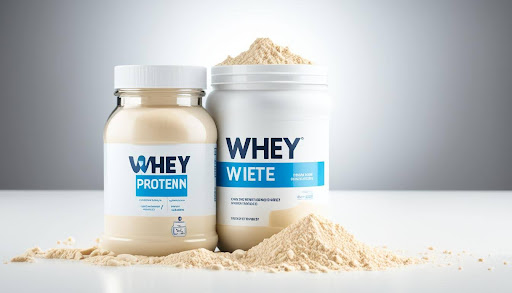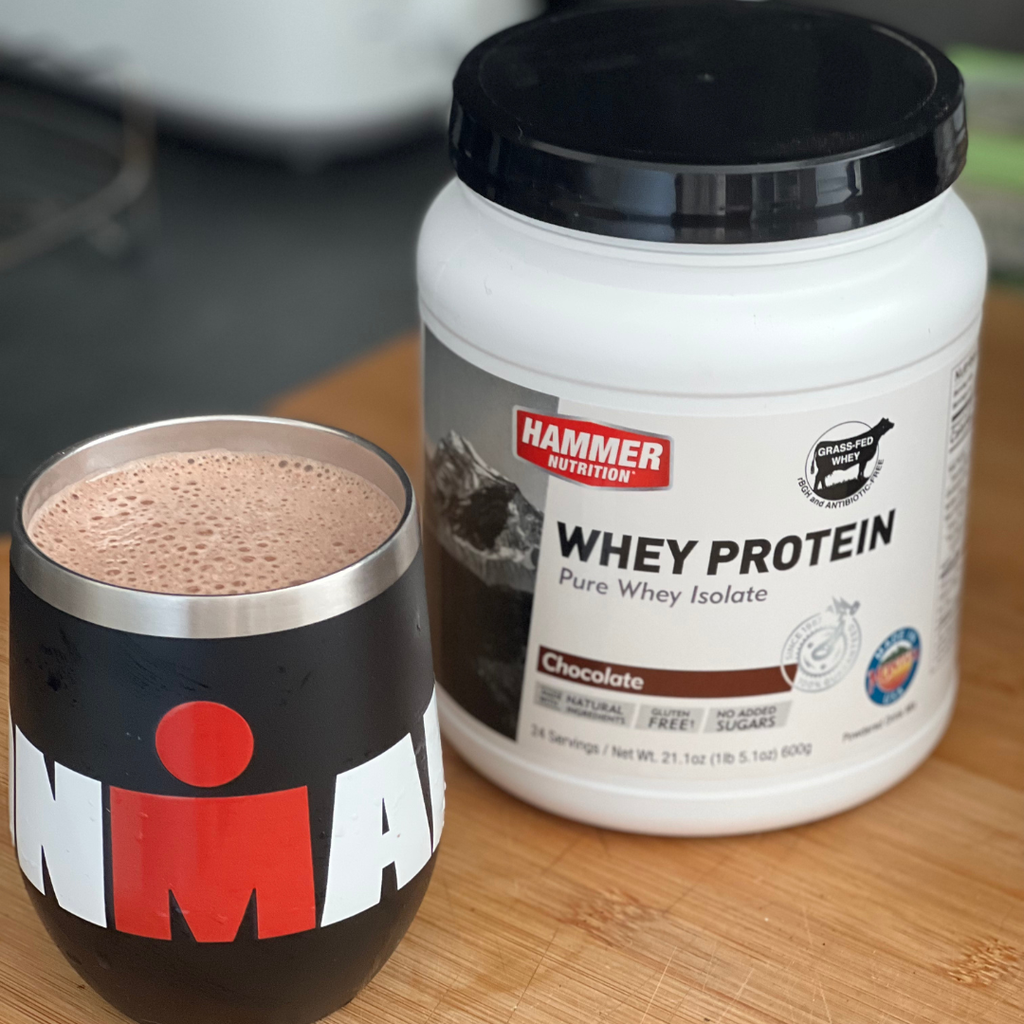Is Whey Protein Good for You?

When it comes to maintaining a healthy lifestyle, it's essential to fuel our bodies with the right nutrients. One such nutrient that has gained popularity in the health and fitness community is whey protein. But what exactly is whey protein, and is it good for you?
Whey protein is a complete protein that contains all nine essential amino acids our bodies need for optimal health. It is derived from the liquid left behind after milk curdles during cheese-making. This protein powerhouse has been shown to have numerous health benefits, making it a popular choice for muscle building, weight loss, and overall wellness.

Key Takeaways:
- Whey protein is a complete protein containing all essential amino acids.
- It is derived from the liquid left after milk curdles during cheese-making.
- Whey protein offers a range of health benefits, including muscle building and weight management.
- Individual needs and potential risks should be considered before incorporating whey protein into your routine.
- Choosing a high-quality whey protein product is essential for maximizing its benefits.
Understanding Whey Protein and Its Different Forms
When it comes to whey protein, it's important to understand its various forms and how they differ. Whey protein is derived from whey, which is the liquid that remains after milk curdles during cheese-making. This protein powerhouse is available in three main forms: concentrate, isolate, and hydrolysate.
Defining Whey Protein and Its Origin
Whey protein is a high-quality protein that contains all nine essential amino acids. It is a byproduct of the cheese-making process, where whey is separated from the curds. This liquid is then processed and concentrated to create different forms of whey protein.
Types of Whey: Concentrate, Isolate, and Hydrolysate
There are three primary types of whey protein: concentrate, isolate, and hydrolysate.
| Types of Whey Protein | Protein Content | Fat Content | Lactose Content | Digestion and Absorption |
| Whey Protein Concentrate | Varies (typically 70-80%) | Varies | Varies | Relatively slow |
| Whey Protein Isolate | High (over 90%) | Low | Low | Fast |
| Whey Protein Hydrolysate | Varies (typically similar to concentrate or isolate) | Varies | Varies | Faster (pre-digested) |
Whey protein concentrate contains varying levels of protein, lactose, and fat. On the other hand, whey protein isolate has a higher protein content and lower levels of lactose and fat. Hydrolysate, often referred to as a "predigested" form, undergoes a process that breaks down proteins for easier digestion and absorption.
The Role of Amino Acids in Whey Protein
One of the key reasons whey protein is highly regarded is its amino acid profile. Amino acids are the building blocks of protein and are crucial for various bodily functions. Whey protein contains a rich array of essential amino acids, which are not naturally produced by the body and must be obtained through diet or supplementation. These essential amino acids play a vital role in muscle growth, recovery, immune function, and overall health.
Is Whey Protein Good for You: Health Benefits Explored
Whey protein is a highly beneficial nutritional supplement that offers a range of health benefits. It is known for its ability to promote muscle building and aid in post-workout recovery. The rich amino acid profile of whey protein supports the growth and repair of muscles, helping individuals achieve their fitness goals.
Influence on Muscle Building and Recovery
Whey protein contains essential amino acids, including leucine, which plays a key role in stimulating muscle protein synthesis. By providing the body with a readily available source of protein, whey protein enhances the muscle-building process and promotes faster recovery after intense workouts. It is particularly effective when consumed shortly after exercise, maximizing its impact on muscle growth and repair.
Impact on Weight Management and Satiety
Whey protein can also be beneficial for weight management. It increases satiety, making individuals feel fuller for longer periods. By reducing hunger and cravings, whey protein helps control calorie intake and supports weight loss efforts. Additionally, the high protein content in whey protein aids in preserving lean muscle mass during weight loss, ensuring that the body primarily targets fat stores.
Contributions to Overall Wellness and Immune Function
In addition to its muscle-building and weight management benefits, whey protein has been shown to have positive effects on overall wellness and immune function. It boosts the body's antioxidant defenses, which helps combat oxidative stress and inflammation. Moreover, whey protein contains bioactive peptides that can enhance immune function and provide support for a healthy immune system.
Health Benefits of Whey Protein
| Health Benefit | Description |
| Muscle Building | Supports muscle protein synthesis and aids in post-workout recovery. |
| Weight Management | Increases satiety, controls calorie intake, and supports fat loss. |
| Overall Wellness | Boosts antioxidant defenses, reduces oxidative stress, and supports a healthy immune system. |
Whey Protein Versus Other Protein Sources
Comparison of Animal-Based and Plant-Based Proteins
When it comes to protein sources, whey protein stands out due to its unique nutritional profile. Let's compare whey protein with other animal-based and plant-based proteins:
| Protein Source | Nutritional Profile | Leucine Content | Digestion and Absorption |
| Whey Protein | Complete protein with all essential amino acids. | Typically higher in leucine, which supports muscle building. | Highly digestible and quickly absorbed by the body. |
| Animal-Based Proteins | Complete proteins, but may contain higher amounts of saturated fat. | Varying leucine content depending on the type of animal protein. | Digestion and absorption rates vary. |
| Plant-Based Proteins | Incomplete proteins, lacking certain essential amino acids. | Lower leucine content compared to whey protein. | Digestion and absorption rates may be slower. |
As seen in the comparison, whey protein is a complete protein, containing all essential amino acids. It is typically higher in leucine, which is important for muscle building. Furthermore, whey protein is highly digestible and quickly absorbed by the body, making it an ideal choice for individuals looking for efficient protein sources.
Hydrolysate for Enhanced Digestion and Absorption
In addition to its unique nutritional profile, whey protein also offers the option of hydrolysate form. Hydrolysate whey protein has undergone a process that pre-digests it, breaking down the proteins into smaller peptides. This enhances its digestion and absorption, making it an excellent choice for individuals with digestive issues or those seeking superior protein utilization.
Overall, whey protein, with its complete amino acid profile, high leucine content, and easy digestion and absorption, sets itself apart from other protein sources. Whether you prefer animal-based or plant-based proteins, whey protein offers unique advantages that can contribute to your nutritional goals.
Optimizing Your Fitness: Whey Protein for Muscle Growth and Strength
When it comes to achieving your fitness goals, whey protein can be a powerful ally. Not only does it provide essential nutrients to support overall health, but it is also highly beneficial for muscle growth and strength.

Key Amino Acids in Whey: The Leucine Factor
Whey protein contains a rich profile of amino acids, including a particularly important one called leucine. Leucine plays a crucial role in stimulating muscle protein synthesis, which is the process that drives muscle growth and repair. By consuming whey protein, you're ensuring that your body has an abundant supply of this key amino acid to promote muscle development.
HAMMER NUTRITION Endurance BCAA+
Consumption Timing and Its Effects on Muscular Adaptations
Timing is everything when it comes to maximizing the benefits of whey protein. Research suggests that consuming whey protein immediately after a workout can enhance muscular adaptations. By providing your muscles with a readily available source of amino acids and nutrients, whey protein helps support their recovery and growth after the stress of exercise.
"Proper timing of whey protein consumption can optimize muscle growth and recovery, helping you make the most of your workouts."
The Role of Whey in Post-Workout Recovery
Post-workout recovery is a critical phase for muscle growth and repair. Whey protein is an excellent choice for this period due to its fast absorption and high bioavailability. By consuming whey protein after your workout, you're replenishing your muscles with the necessary amino acids they need to recover, rebuild, and adapt to the stresses placed upon them during exercise.
Visualize the aftermath of a rigorous workout, with an emphasis on muscle recovery and growth using whey protein. Include elements that represent rejuvenation, replenishment, and revitalization. Use colors and textures that convey a sense of energy, vitality, and health. Depict the feeling of strength, power, and fitness through the use of bold shapes and lines, along with elements that suggest movement and action. Create a scene that captures a moment in time, focusing on the body's natural ability to heal and recover from physical exertion.
Incorporating whey protein into your fitness routine can have a significant impact on your muscle growth and strength goals. Its high-quality amino acids and optimal consumption timing make it a valuable tool for optimizing the benefits of your workouts.
Benefits of Whey Protein for Muscle Growth and Strength
- Stimulates muscle protein synthesis
- Aids in post-workout recovery
- Provides essential amino acids for muscle development
- Enhances muscular adaptations from exercise
Who Can Benefit from Whey Protein?

Whey protein is a versatile supplement that offers a range of benefits, making it suitable for various individuals:
- Athletes and Fitness Enthusiasts: Whey protein can support muscle recovery and help enhance performance during workouts.
- Individuals Looking to Manage Weight: The satiating effect of whey protein can aid in weight management and support fat loss.
- Older Adults: Whey protein can help preserve and build muscle mass, which tends to decline with age.
With its ability to promote muscle recovery, aid in weight management, and support muscle mass preservation, whey protein is a valuable supplement for athletes, fitness enthusiasts, and older adults alike.
The Potential Risks and Side Effects of Whey Protein Supplementation
Considerations for Those with Lactose Intolerance and Milk Allergies
While whey protein is considered safe for most people, it's important to note that individuals with lactose intolerance or milk allergies may need to take special precautions when using whey protein supplements. Whey protein is derived from milk, and as such, it contains lactose, the sugar found in milk. Lactose intolerance is the inability to digest lactose due to a deficiency of lactase, the enzyme that breaks down lactose in the body. For individuals with lactose intolerance, consuming whey protein may lead to digestive discomfort, such as bloating, gas, and diarrhea.
Similarly, individuals with milk allergies may experience adverse reactions when consuming whey protein. Milk allergies are caused by an immune response to the proteins found in milk, including whey protein. Symptoms of milk allergies can range from mild to severe and may include hives, swelling, difficulty breathing, and even anaphylaxis, a life-threatening allergic reaction.
Therefore, if you have lactose intolerance or a milk allergy, it's essential to choose lactose-free whey protein options or seek alternative protein sources that don't contain milk-derived ingredients. Always read product labels carefully to ensure they are suitable for your specific dietary needs.
Balancing Protein Intake: Avoiding Excessive Consumption
While protein is an essential macronutrient that plays a vital role in various bodily functions, including muscle building, excessive consumption of protein, including whey protein, may have potential risks and side effects. Consuming excessively high amounts of protein can put strain on the kidneys and may lead to an increased risk of kidney damage or kidney stones. It's important to note that the recommendation for daily protein intake varies based on individual factors, such as age, sex, and activity level.
When incorporating whey protein into your diet, it's crucial to consider your overall protein intake from all sources, including food and other supplements. Consult with a healthcare professional or registered dietitian to determine the appropriate protein intake for your specific needs and goals. They can help you create a balanced diet plan that includes an adequate amount of protein without going overboard.
Steering Clear of Additives: Pure Protein vs. Sweetened Formulas
When selecting a whey protein supplement, it's important to be mindful of the additives and sweeteners that may be included in some formulations. While many whey protein products are available in pure protein form, some may contain additional ingredients like artificial sweeteners, flavors, or preservatives. These additives may not be desirable for certain individuals with specific dietary preferences or sensitivities.
Opting for pure whey protein without additional additives can help ensure a cleaner and more natural supplement. Read product labels carefully and choose brands that prioritize transparency and ingredient quality. Look for whey protein powders that only contain the necessary ingredients, without any unnecessary additives or sweeteners.
| Common Risks and Side Effects of Whey Protein Supplementation |
| Lactose intolerance symptoms: bloating, gas, diarrhea |
| Milk allergy symptoms: hives, swelling, difficulty breathing |
| Potential strain on kidneys with excessive protein consumption |
| Possible kidney damage or kidney stone formation |
| Additives and sweeteners in some whey protein products |
How to Choose a High-Quality Whey Protein Product
When it comes to selecting a high-quality whey protein product, there are several factors to consider. Purity, sourcing, and manufacturing processes all play a crucial role in determining the quality of the product. By paying attention to these aspects, you can ensure that you are getting a whey protein product that meets your standards and nutritional needs.
Hammer Nutrition Whey Protein Powder

One reputable brand that offers a top-notch whey protein powder is Hammer Nutrition. Their whey protein powder is sourced from grass-fed cows, which ensures a clean and natural product. Grass-fed cows produce milk that is free from hormones, antibiotics, and artificial additives, resulting in a purer whey protein powder.
Furthermore, Hammer Nutrition employs a gentle processing method to preserve the integrity of the protein. This method prevents excessive heat or harsh chemical treatments that can denature the protein and diminish its nutritional value. The end result is a high-quality whey protein powder that retains its beneficial properties.
Choosing Hammer Nutrition whey protein powder means selecting a product that prioritizes quality and purity. With their commitment to sourcing and manufacturing excellence, you can have confidence in the whey protein you are consuming.
Conclusion
Whey protein is a highly beneficial supplement that offers a wide range of health benefits. Whether you're looking to improve your fitness, achieve muscle growth, manage your weight, or enhance your overall wellness, whey protein can be a valuable addition to your lifestyle.
Whey protein is particularly renowned for its ability to promote muscle growth and aid in post-workout recovery. Its rich amino acid profile, including essential amino acids like leucine, makes it an excellent choice for individuals focused on building strength and increasing muscle mass.
In addition to its impact on fitness, whey protein can also support weight management and satiety. By incorporating whey protein into your diet, you may experience increased feelings of fullness, which can help curb cravings and promote weight loss.
When choosing a whey protein product, it's important to select a high-quality option that aligns with your individual needs and preferences. Look for reputable brands that prioritize purity, sourcing, and manufacturing processes, such as Hammer Nutrition's whey protein powder sourced from grass-fed cows.
By incorporating a high-quality whey protein product into a balanced diet and fitness routine, you can optimize the numerous health benefits that whey protein has to offer. So why wait? Start harnessing the power of whey protein today and take the first step towards achieving your fitness and wellness goals.
Frequently Asked Questions
Q. Is whey protein good for you?
Yes, whey protein is good for you. It offers numerous health benefits such as promoting muscle building and aiding in weight loss and weight management.
Q. What are the different forms of whey protein?
Whey protein is available in three main forms: concentrate, isolate, and hydrolysate. Each form has varying amounts of protein, lactose, and fat.
Q. What role do amino acids play in whey protein?
Amino acids are the building blocks of protein. Whey protein is rich in essential amino acids, which are necessary for the body's functions.
Q. What are the health benefits of whey protein?
Whey protein has numerous health benefits, including promoting muscle building and recovery, aiding in weight management and satiety, and contributing to overall wellness and immune function.
Q. How does whey protein compare to other protein sources?
Whey protein is a complete protein that contains all essential amino acids. It is highly digestible and quickly absorbed by the body. In comparison to plant-based proteins, whey protein is typically higher in leucine, which plays a key role in muscle building.
Q. Does whey protein help with muscle growth and strength?
Yes, whey protein can help with muscle growth and strength. It contains key amino acids, such as leucine, which stimulate muscle protein synthesis and aid in post-workout recovery.
Q. Who can benefit from whey protein?
Whey protein is beneficial for athletes, fitness enthusiasts, and individuals looking to manage their weight or preserve muscle mass, especially as they age.
Q. Are there any potential risks or side effects of whey protein supplementation?
Individuals with lactose intolerance or milk allergies may need to opt for lactose-free whey protein. It is also important to balance protein intake and avoid excessive consumption. Additionally, some whey protein products may contain additives and sweeteners that may not be desirable for certain individuals.
Q. How do I choose a high-quality whey protein product?
One reputable brand is Hammer Nutrition, which offers a high-quality whey protein powder sourced from grass-fed cows and processed gently to preserve the protein's integrity.







![[AMB] Hammer Gel Sampler Kit](/web/image/product.product/3784/image_256)